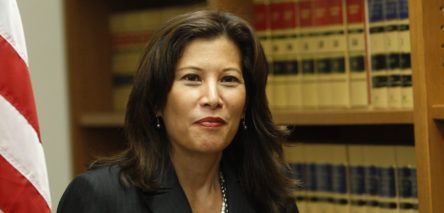Court ruling praised by both sides of pension debate
 For the second time in two years, the California Supreme Court has released a ruling on a large state issue that analysts say creates new uncertainty going forward.
For the second time in two years, the California Supreme Court has released a ruling on a large state issue that analysts say creates new uncertainty going forward.
Last week, the court issued its long-awaited decision in a court case involving a Sacramento local firefighters union that alleged a provision of the 2012 pension reform measure approved by the Legislature and signed by then-Gov. Jerry Brown was illegal under the “California Rule.” That’s the legal concept stemming from a 1955 state Supreme Court ruling that holds the terms of a public employee’s pension benefit cannot be reduced for years not yet worked, only kept the same or increased.
Cal Fire Local 2881 said that the pension reform’s ban on “air time” – the purchase of service credits to enhance pensions – violated the California Rule. But a unanimous state Supreme Court said “air time” was not a comprehensively bargained or legislatively approved vested right.
Yet in the lead opinion, Chief Justice Tani Cantil-Sakauye (pictured) explicitly said she was not taking a position on the California Rule question of whether pension terms could be changed going forward for years not worked.
This mixed message produced media confusion. Some news bulletins declared the justices had approved allowing a rollback of local benefits. Others suggested the California Rule had dodged a bullet.
Was ‘California Rule’ weakened or untouched?
Interest groups were similarly split.
Officials with the League of California Cities saw the court’s willingness to change the terms of pensions on a relatively minor issue as a sign it was open to a significant weakening of the California Rule. The league and many like groups hope for a state Supreme Court ruling that echoes a lower court’s ruling that pensions are not “immutable.” They were heartened by Cantil-Sakauye specifically noting the state had raised the retirement age from 67 to 70 for current as well as prospective employees.
But the Californians for Retirement Security, which represents 1.6 million public employees and former public employees, declared victory after noting that Cantil-Sakauye had specifically said “air time” was changeable because it was not a vested right – unlike basic pension formulas basing retirement checks on years worked times a percent of late-career salary.
The group and others also cited a concurring opinion written by Justice Leondra Kruger and joined by Justice Goodwin Liu that held that government employers could not “withdraw” from the pension terms established upon initial employment by “an implied unilateral contract.”
The state Supreme Court is expected to eventually take up at least two more cases involving union objections to the 2012 pension reform, so the sanctity and extent of the California Rule is likely to remain in the news. In his final year in office, Gov. Jerry Brown repeatedly urged the court to give governments the option to change future pension terms as pension costs have crowded out local, county and school programs and services. Brown’s office defended the 2012 reform law before the high court because of concern that state Attorney General Xavier Becerra was not eager to defend it.
Like 2017 case, ruling seen as murky, not clarifying
But in the meantime, last week’s ruling seems as murky as the court’s decision in the 2017 California Cannabis Coalition v. City of Upland case. Previously, Proposition 218, approved by voters in 1996, had been understood to require that any tax whose revenue would go to a special purpose – building a sports arena, adding libraries, etc. – had to be approved by a two-thirds vote.
Upending decades of precedent, the state Supreme Court held in a 5-2 decision that the two-thirds threshold applied only to ballot measures initiated by local governments. Because they were not local government measures, those qualified by citizen initiatives only needed simple majority support to be enacted.
In dissent, Justice Kruger took square aim at the idea that this interpretation was what voters expected in 1996 when they made it harder for local governments to raise taxes.
Kruger wrote, “A tax passed by voter initiative, no less than a tax passed by vote of the city council, is a tax of the local government, to be collected by the local government, to raise revenue for the local government. None of this could have been lost on the electorate that, also by initiative, amended the California Constitution to set ground rules for voter approval of local taxes.”
Chris Reed
Chris Reed is a regular contributor to Cal Watchdog. Reed is an editorial writer for U-T San Diego. Before joining the U-T in July 2005, he was the opinion-page columns editor and wrote the featured weekly Unspin column for The Orange County Register. Reed was on the national board of the Association of Opinion Page Editors from 2003-2005. From 2000 to 2005, Reed made more than 100 appearances as a featured news analyst on Los Angeles-area National Public Radio affiliate KPCC-FM. From 1990 to 1998, Reed was an editor, metro columnist and film critic at the Inland Valley Daily Bulletin in Ontario. Reed has a political science degree from the University of Hawaii (Hilo campus), where he edited the student newspaper, the Vulcan News, his senior year. He is on Twitter: @chrisreed99.
Related Articles
Sowell Crashes CA Bullet Train
John Seiler: I’ve been reading Thomas Sowell for about 35 years now. He’s one of the few economists who can
Filner’s fate: The warring conventional wisdoms
There are two conventional wisdoms about Bob Filner, San Diego’s embattled pervert of a mayor, and they can’t both be
Is climate a winning issue for Tom Steyer?
Can the climate vote? According to National Journal, billionaire hedge-fund maestro Tom Steyer is considering a run for the U.S.




